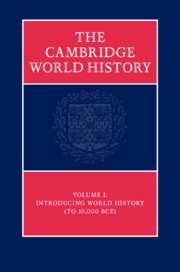
- Publisher:
- Cambridge University Press
- Online publication date:
- May 2015
- Print publication year:
- 2015
- Online ISBN:
- 9781139194662
- Subjects:
- American History: General Interest, British History: General Interest, Regional and World History: General Interest, History, Regional History Before 1500, Global History
- Collections:
- Cambridge Histories - Global History, Cambridge Histories - Ancient History & Classics, Cambridge Histories - British & European History, Cambridge Histories - American History, Cambridge Histories - Asian History, Cambridge Histories - Middle East & African Studies
- Series:
- The Cambridge World History



